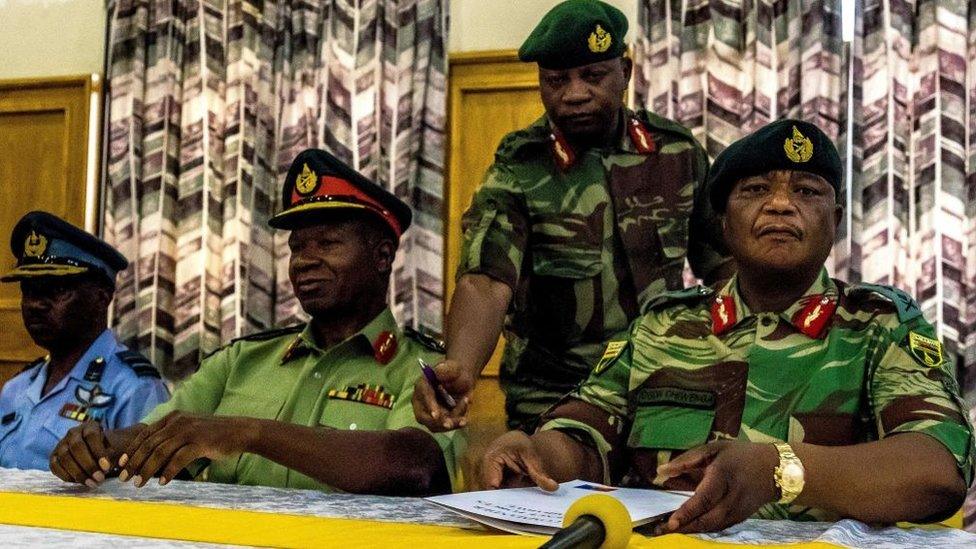Zimbabwe's Mugabe ignores party deadline to quit
- Published
Zimbabwe's week of upheaval in two minutes
Zimbabwe's ruling Zanu-PF party has summoned its MPs to discuss the future of its leader, President Robert Mugabe, after a deadline for his resignation came and went on Monday.
The deadline was set by Mr Mugabe's own party, Zanu-PF.
The embattled leader surprised Zimbabweans on Sunday, declaring on TV that he planned to remain as president.
Zanu-PF says it backs impeachment, and proceedings could begin as soon as Tuesday when parliament meets.
In a draft motion seen by Reuters news agency, the party blamed the president for an "unprecedented economic tailspin".
Mr Mugabe's grip on power has weakened considerably since the country's army intervened last Wednesday in a row over who should succeed him.
The crisis began two weeks ago when the 93-year-old leader sacked his deputy Emmerson Mnangagwa, angering army commanders who saw it as an attempt to position his wife Grace as next president.
Zimbabwe has since then seen huge street rallies demanding his immediate resignation.
The protests have been backed by the influential war veterans - who fought in the conflict that led to independence from Britain in 1980.
The group's leader, Chris Mutsvangwa, on Monday called for more demonstrations. "Mugabe, your rule is over," Mr Mutsvangwa said. "The emperor has no clothes."
Choreographing a departure
Andrew Harding in Harare
The city is swirling with rumours that Mr Mugabe is planning his resignation and that he may go back on television to announce it at any stage, and that Sunday's speech was simply about giving carte blanche to the military for what they've done.
But we just don't know at this stage if he will give in to the pressure from the war veterans, his own party, and the public.
Mr Mugabe said in his speech that he planned to preside over the Zanu-PF congress next month, a statement people here found baffling after the party voted to strip him of his leadership and kick out his wife.
What is clear is that everyone here believes that the Mugabe era is over. Saturday's protests unleashed something and people believe that a line has been crossed. Now it is really about negotiating the time, the process, the choreography of Mr Mugabe's departure.
The fear of Zanu-PF and of the security services will not go away overnight. People here grew up with that fear. In the meantime, the streets are calm, but Tuesday may bring more demonstrations.
Robert Mugabe: "The congress is due... I will preside over its processes"
What did Mugabe say in his speech?
During the 20-minute address, the president, who was flanked by generals, made no mention of the pressure from his party and the public to quit.
Instead, he declared that the military had done nothing wrong by seizing power and placing him under house arrest.
"Whatever the pros and cons of how they [the army] went about their operation, I, as commander-in-chief, do acknowledge their concerns," he said, in reference to the army's move last week to take over the state broadcaster in the capital Harare.
He also said "the [Zanu-PF] party congress is due in a few weeks and I will preside over its processes".
Before Mr Mugabe's speech, Mr Mnangagwa was named as Zanu-PF's new leader and candidate for the 2018 general elections, while Mr Mugabe's wife was expelled.
BBC Africa Editor Fergal Keane said his understanding was that Mr Mugabe had agreed to resign, but then changed his mind.
Our correspondent says the generals have no intention of forcing Mr Mugabe out by the barrel of a gun, and are happy to let the Zanu-PF carry out its procedures, working through impeachment if necessary.
So what happens next?
Impeachment proceedings could be launched on Tuesday in parliament - but it is not clear how long this would take.
Both the National Assembly and the Senate need to pass a vote by simple majority to begin the process, which is laid out in the constitution.
This can either be on grounds of "serious misconduct", "violation" of the constitution or "failure to obey, uphold or defend" it, or "incapacity".
The chambers must then appoint a joint committee to investigate removing the president.
If the committee recommends impeachment, the president can then be removed if both houses back it with two-thirds majorities.
The opposition MDC-T party has tried unsuccessfully to impeach Mr Mugabe in the past, but this time the ruling party - which has an overwhelming majority in both houses - is likely to go against him.
Zimbabwe reacts: "We need him to resign... our lives are terrible right now"
The advantage for the military is that if Mr Mugabe is impeached, it can claim that he was removed legally, and not by force.
The problem for the generals is that the current vice-president would then take power. That is Phelekezela Mphoko, a supporter of Mr Mugabe's wife Grace.
The military would prefer to install Emmerson Mnangagwa, the former vice-president who was briefly exiled.
And it is still possible that Mr Mugabe could delay the process or cling to power by refusing to resign - and be forced into exile himself.
What's the reaction been?
The War Veterans Association, which used to back Mr Mugabe, now says it is time for him to step down.
"Thirty-seven years, you have had your time, you are toast now politically," Mr Mutsvangwa told the BBC.
Opposition leader Morgan Tsvangirai said he was "baffled" by the president's address.
"He's playing a game. He has let the whole nation down," he told Reuters news agency.
Mr Mugabe has led the country since it gained independence from Britain in 1980.
- Published19 November 2017
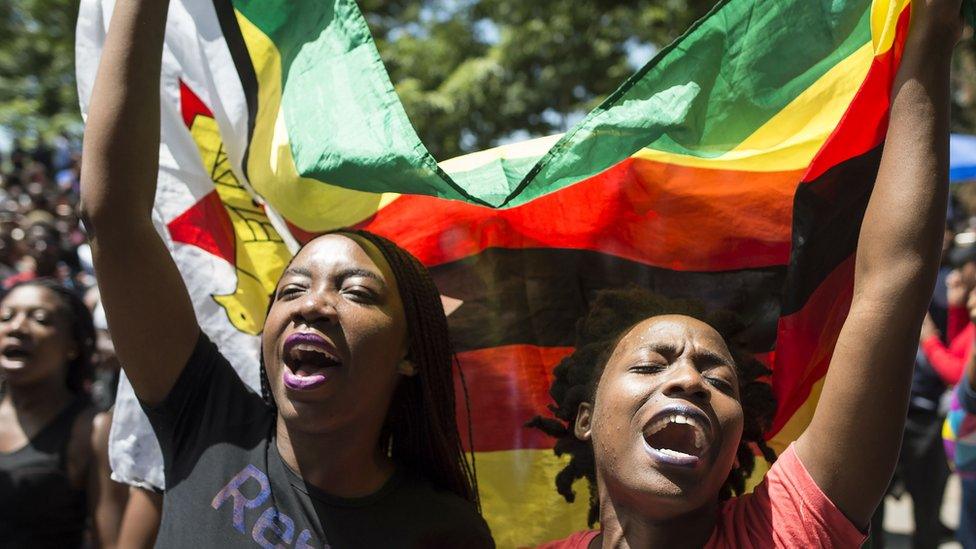
- Published3 August 2018
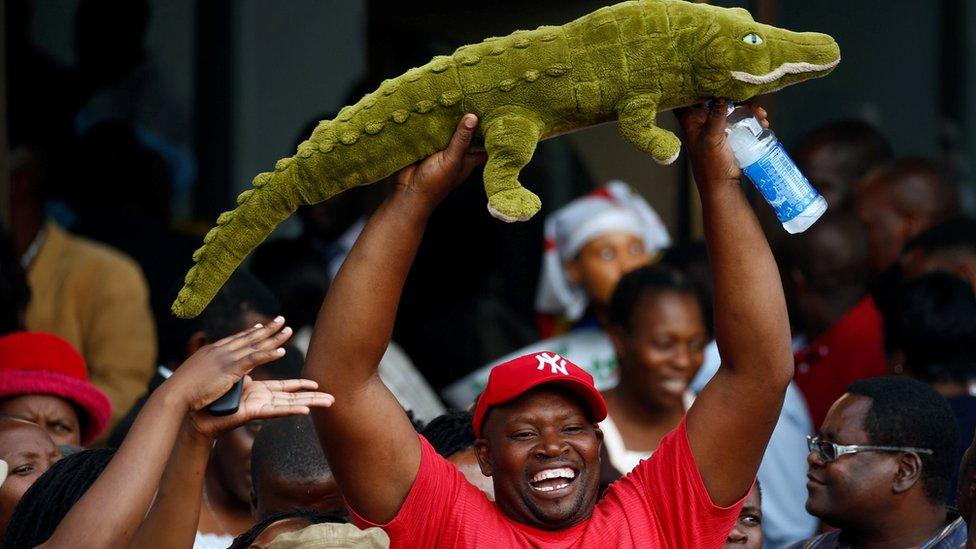
- Published21 November 2017
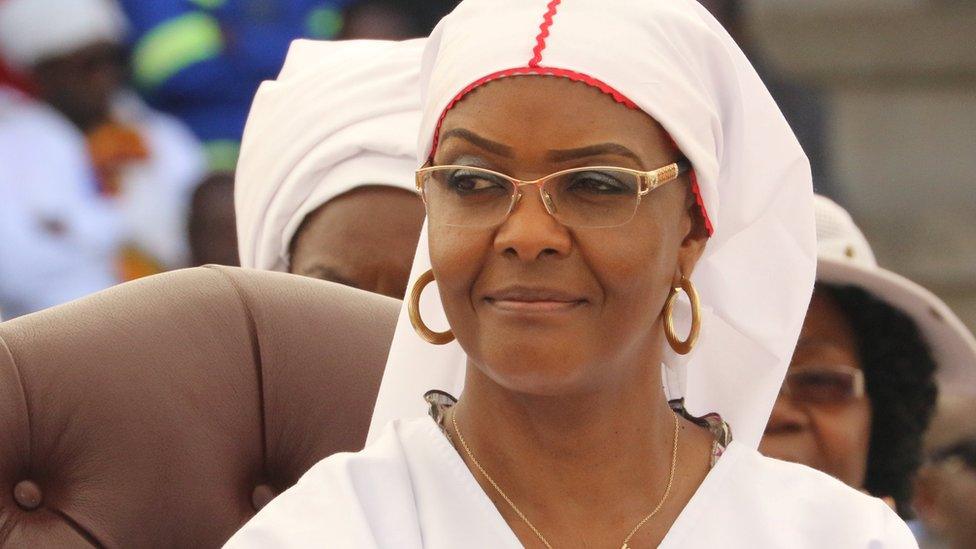
- Published18 November 2017
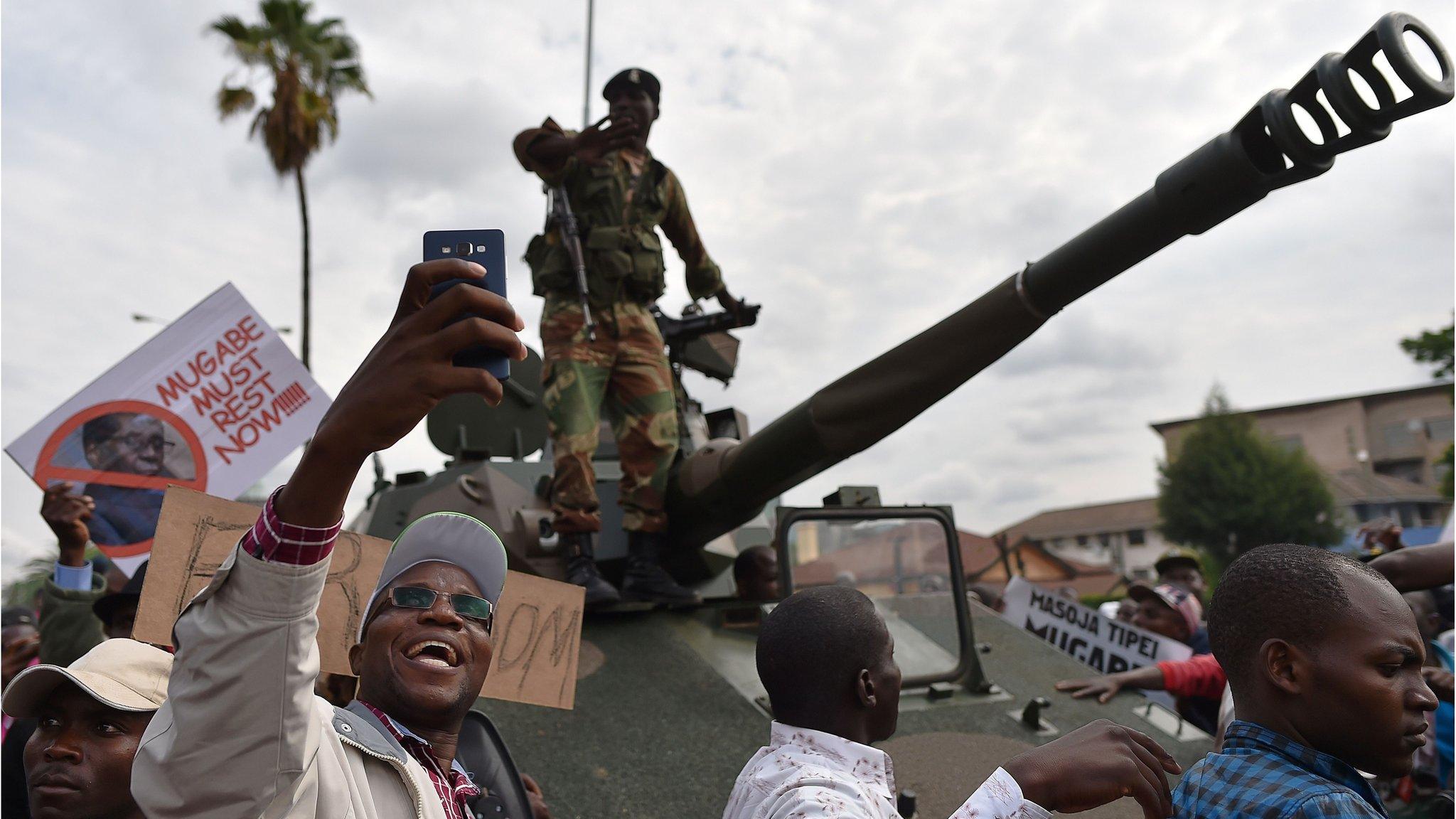
- Published19 November 2017
